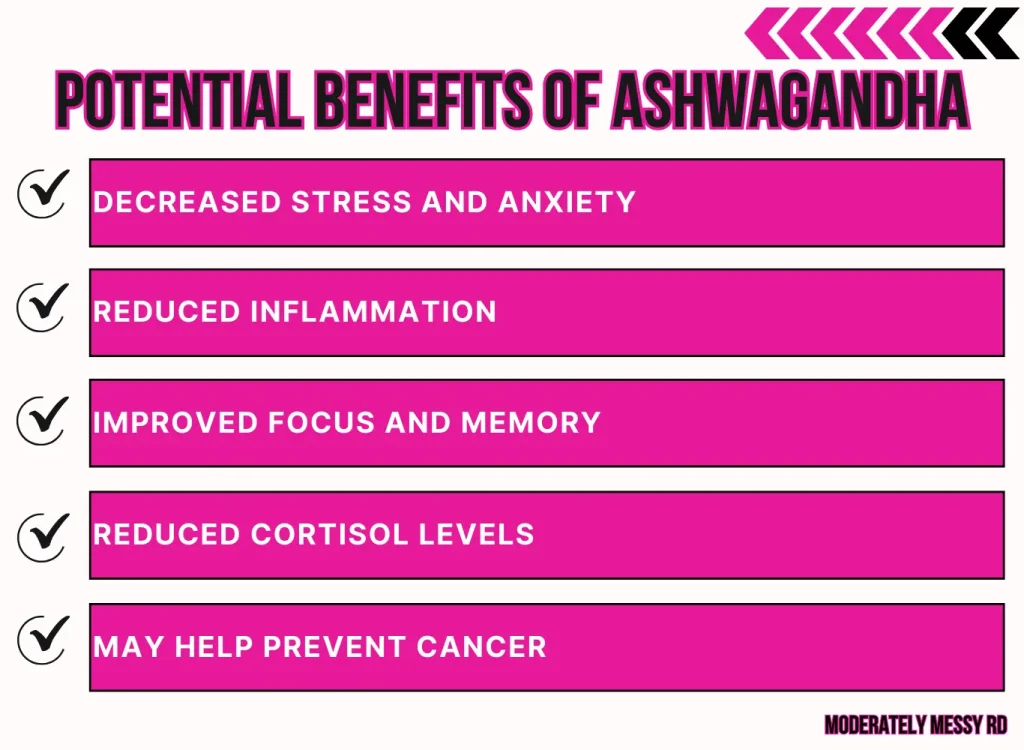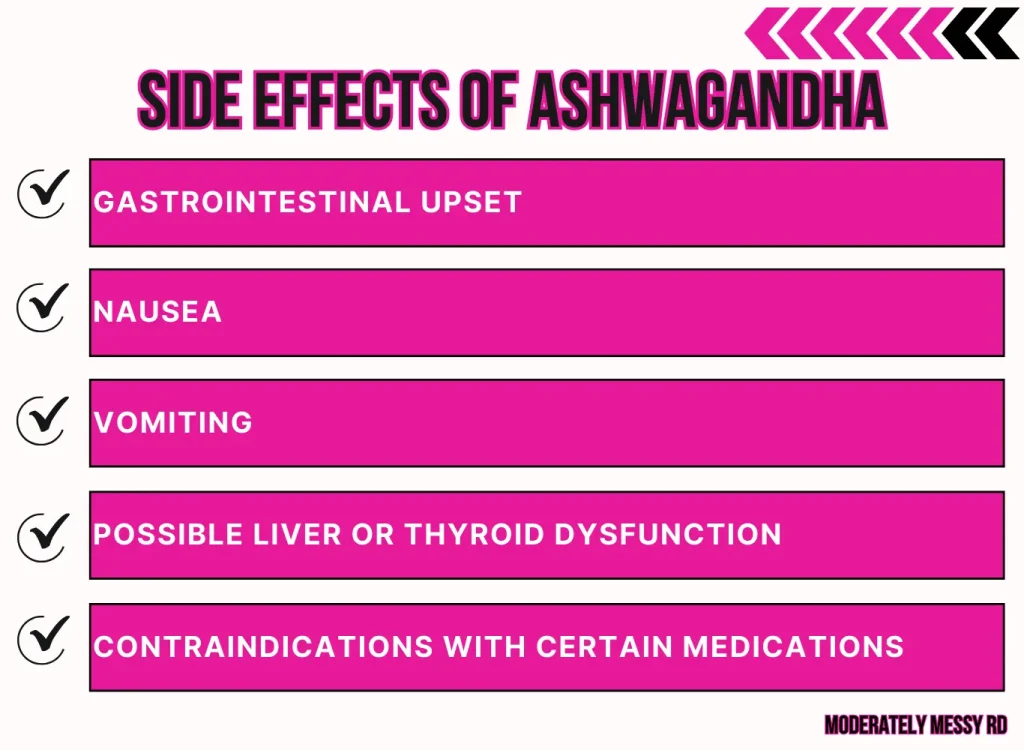Have you ever been influenced on TikTok? I recently came across a video of a celebrity {Nikki Reed} talking about how ashwagandha helps with sleep and anxiety. As someone who struggles with both, I immediately went on Amazon and bought the supplement.
Now, it’s not really like me to try herbal supplements as I know that there likely isn’t a lot of research to back up these claims. I can almost guarantee the conclusion of this post will go something like this: yes, there are many potential benefits but further research is needed (spoiler alert: that is correct).

Either way, I bought it – and I have to decide if I should keep taking it. Let’s discuss the latest research on ashwagandha supplements so you can decide (and me too) if you want to try it.
What is Ashwagandha?

Ashwagandha, or withania somnifera, is an herb that has been used in Indian traditional medicine for thousands of years with potential anti-stress, anti-inflammatory, antimicrobial, anti-cancer, anti-diabetic, anti-obesity, cardioprotective, and hypolipidemic properties.
The root of the plant smells like a horse, which is where it gets the name ashwagandha – which means consuming it gives the power of a horse.
It is commonly referred to as an “adaptogen” as it can help the body adapt to stressful conditions.
Potential Benefits of Ashwagandha

Overall, the research on the potential benefits of ashwagandha is limited. Most of the studies are subjective, meaning the results are based on the participants opinions and reported symptoms.
Ashwagandha supplements are most commonly used for sleep and anxiety, which most studies focus on – so let’s take a look at the latest research.
Anxiety
There have actually been several clinical trials which suggest that ashwagandha may reduce stress and anxiety.
A systematic review and meta-analysis published in 2022 looked at 12 different studies to examine the link of taking ashwagandha on stress and anxiety. It was concluded that those who took ashwagandha extract reported significantly lower levels of anxiety and stress compared to the placebo group.
In 2021, a systematic review of seven randomized-controlled studies found that those who took the extract had significantly lower levels of stress and anxiety based on a subjective rating scale. Ashwagandha extract was also found to reduce serum cortisol levels.
Sleep
In 2021, a systematic review and meta-analysis examined 5 randomized-controlled trials with 400 total participants. Ashwagandha extract was found to increase mental alertness with a small but significant affect on sleep. The benefits were more pronounced for those who took a larger dose of the supplement and for at least 8 weeks.
Another 2021 study found that ashwagandha extract significantly improved sleep and may help with managing insomnia.
How does it “improve sleep”? Well, it has been suggested that it might help increase the time spent sleeping as well as how fast you fall asleep.
The mental alertness was found in the morning upon rising – possibly related to participants experiencing a better night of sleep.
Related Posts:
— Increasing Vitamin D Intake Through Foods {with Recipes}
— Prioritizing Self-Care as a Mom
— Food Swaps for Gut Health
Potential Side Effects

Taking ashwagandha in supplement form is generally recognized as safe, however, there are no long-term research studies! This means we really don’t know what the long-term benefits or side effects are from a research perspective.
Higher doses can cause stomach upset, diarrhea, vomiting, and nausea. Although rare, there have been reported cases of liver and thyroid dysfunction with long-term use.
The NIH states it should not be used if you’re pregnant or breastfeeding. Check with your healthcare provider prior to taking a supplement, as it may be contraindicated with certain medical conditions and medications.
What Do People Say About It?
First of all, I did notice right away that taking the supplement in the evening resulted in increased sleepiness and possibly a more calming effect. However, who is to say I haven’t been more tired lately? I am not sure.
When I searched Reddit, I found that some people love it and even swear by it. There were many claims that it improved anxiety, energy levels, and overall sleep quality.
Others actually stated it increased their anxiety while also experiencing emotional numbness and lethargy. I have also heard it can cause vivid dreams.
How to Take Ashwaganda Supplements
First and foremost, no safe or effective dose has been established. Studies show that ashwagandha is most effective when taken in doses between 200-600 milligrams. Cleveland Clinic suggests 500mg twice a day.
Supplements are usually capsule, tablet or powdered form. KSM-66 is the most concentrated and studied form of ashwagandha extract.
I have seen recommendations to take it in the morning and at night – so it might be trial and error to see what works for you. Try both and see how it affects you. Timing can be dependent on your personal preferences, tolerance, and the type of ashwagandha you choose to take.
How Long Until You See the Benefits?
It can take several weeks or months to really see the potential. One study found it took 10 weeks to see the benefits from sleep.
How Do You Pick From All the Supplements on the Market?
It’s always smart to look for a supplement that has been third-party tested to ensure what is listed on the ingredients label is actually what you’re consuming.
Read reviews and try to pick the best one for your symptoms and lifestyle. Many don’t disclose how much ashwagandha is in the product. Therefore, if you really want to see the effects it might make sense to find one that lists the exact amount.
Use With Caution
It seems that some people have very positive effects from taking an ashwaghanda supplement, while others experience unpleasant side effects. And again, it should be noted that the actual research on these supplements is limited.
If you’re someone who has been taking this supplement for awhile – feel free to comment how it makes you feel! Stay tuned for my thoughts – I might just continue to take them out of curiosity (and desperation).
